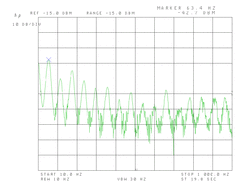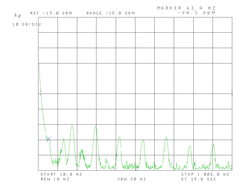I see John Swenson has posted his technique for eliminating leakage currents & guess what - it's effectively the same method recommended by AP that I stated in this closed thread & as practised here by RogerD & others - grounding of chassis between devices. This approach was not plucked out of thin air - it was recommended by the Audio Precision company itself
It was quiet amusing when I read the objections to this grounding technique - one of which was that 2 pin SMPS have plastic cases & therefore can't be grounded. makes one query the level of technical know-how being demonstrated by such objections.
Swenson showed some measurements he made after he had built "a very high impedance (10 giga ohms) differential probe to properly measure leakage current." (necessary to avoid the measurement probe affecting what is being measured)
Measurement of leakage current on the output of SMPS

Measurement of leakage current with ground connection in place

An improvement of > 50dB reduction.
More measurements here when SMPS is powering network switch.
Some people need measurements before they can admit to what the rest of us can hear with our ears - this is for these poor lost souls!
It was quiet amusing when I read the objections to this grounding technique - one of which was that 2 pin SMPS have plastic cases & therefore can't be grounded. makes one query the level of technical know-how being demonstrated by such objections.
Swenson showed some measurements he made after he had built "a very high impedance (10 giga ohms) differential probe to properly measure leakage current." (necessary to avoid the measurement probe affecting what is being measured)
Measurement of leakage current on the output of SMPS

Measurement of leakage current with ground connection in place

An improvement of > 50dB reduction.
More measurements here when SMPS is powering network switch.
Some people need measurements before they can admit to what the rest of us can hear with our ears - this is for these poor lost souls!

